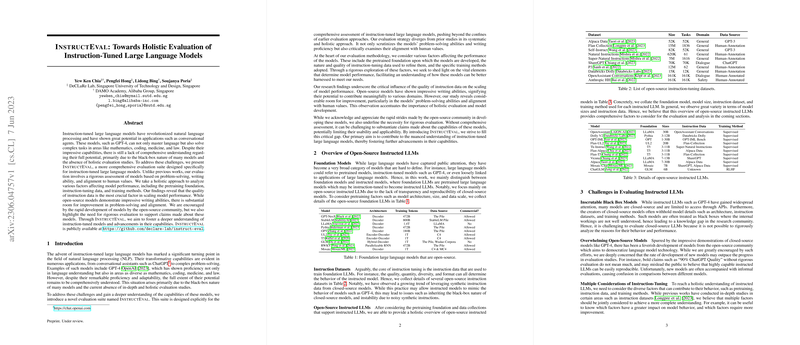Holistic Evaluation of Instruction-Tuned LLMs with InstructEval
The paper presents a comprehensive evaluation suite, InstructEval, designed to assess the capabilities and performance of instruction-tuned LLMs. The introduction of such an analytical framework is of critical importance, given the black-box nature and complex architectures of contemporary models like GPT-4. These models have demonstrated proficiency across various domains, including mathematics, coding, medicine, and law, yet a holistic understanding of their full potential remains elusive.
Key Features of InstructEval
The InstructEval suite aims to move beyond traditional evaluation methods by incorporating a multifaceted approach that examines:
- Problem-solving abilities: Utilizing benchmarks that cover arithmetic, programming, and general knowledge.
- Writing proficiency: Assessment of models in informational, creative, professional, and argumentative writing tasks.
- Alignment with human values: Focusing on helpfulness, honesty, and harmlessness to ensure ethical considerations in AI behavior.
This methodologically rigorous evaluation is predicated on various critical factors including pretraining foundations, instruction-tuning data, and training methodologies.
Insights and Findings
The findings from deploying InstructEval are noteworthy:
- Instruction Data Quality: The quality of instruction data emerges as the primary determinant in scaling model performance. Models trained with high-quality, diverse instructions displayed superior problem-solving capabilities.
- Open Source vs. Closed Source Models: Open-source models reveal commendable writing abilities but manifest notable deficiencies in problem-solving and ethical alignment. Despite being trained on synthetic instructions mimicking models like GPT-3, their performance gains are often limited.
- Specialization and Scalability: The paper highlights the potential specialization of models across different tasks. For instance, proficiency in problem-solving does not necessarily translate into superior writing skills or ethical alignment.
Challenges in Model Evaluation
The task of evaluating LLMs is complicated by several factors:
- Inscrutable Closed-Source Models: Closed-source models limit transparency and reproducibility. Their assessment is challenging due to restricted access and unknown internal configurations.
- Fast-paced Open-Source Developments: While the open-source community rapidly develops new models, rigorous evaluations lag, leading to potentially misleading claims about model capabilities.
- Broader Capability Scope: As models gain the ability to solve domain-specific problems and use external tools, a more nuanced and extensive evaluation is required, incorporating usage scenarios and human-centric behavior.
Future Directions
The implications of InstructEval extend beyond mere model benchmarking. It lays a foundation for the future development of LLMs across multilingual and multimodal dimensions, promoting the advancement of more versatile, ethically-aligned AI systems.
In conclusion, InstructEval fills a critical gap in the systematic evaluation of instruction-tuned LLMs, offering a detailed panorama of their abilities and shortcomings. Through such comprehensive evaluation frameworks, researchers can drive the responsible and effective advancement of AI technologies.
